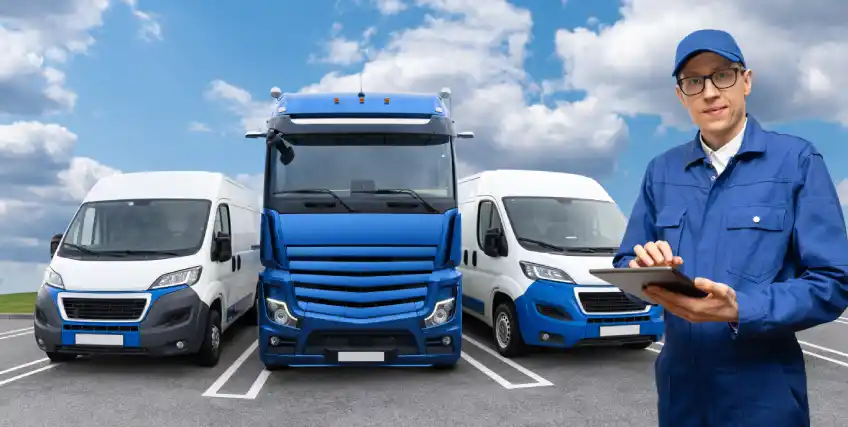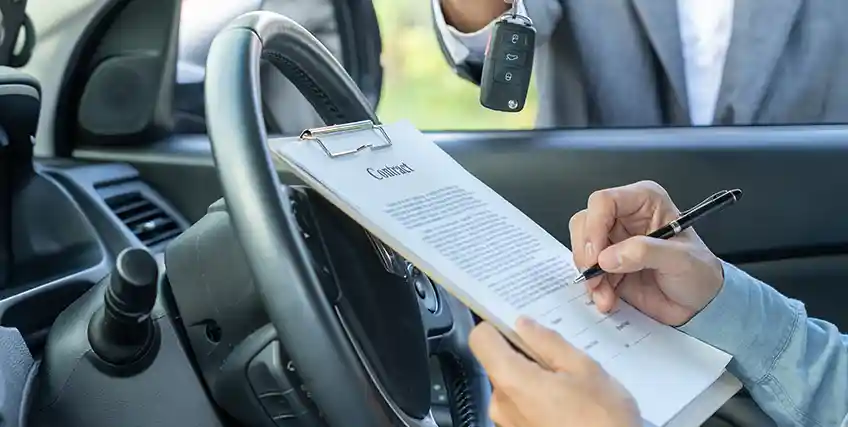How Small Businesses Are Using Auto Loans to Power Last-Mile Delivery
August 12, 2025 | Last Updated on: August 12, 2025

Same-day delivery isn’t a luxury anymore. It’s the norm, especially for florists, food services, and mobile shops trying to compete with the Amazons of the world. Small businesses today don’t just need products. They need wheels.
From fresh-cut roses that can’t sit in a hot trunk, to meal preps that rely on chilled drop-offs, owning a reliable business vehicle is now tied to customer satisfaction. But not every small business can afford a new van or electric truck out of pocket.
That’s where a small business auto loan comes into play. It lets you finance your vehicle the smart way without draining your operating cash. Whether you're buying a used car, investing in refrigerated vans, or upgrading to commercial EVs, the right vehicle financing can help you grow faster, deliver more, and even save on taxes. IRS deductions for business-owned vehicles are real.
As demand for last-mile delivery explodes, more business owners are moving away from rental vans and leaning into ownership. You can brand the vehicle, track delivery performance, and skip the middlemen.
So, if your deliveries are still hit-or-miss, maybe it’s time to rethink your transportation game.
What Is a Small Business Auto Loan?
You’d be surprised how many folks confuse personal and business vehicle financing. A small business auto loan has its own rules, perks, and paperwork and it’s way more flexible than you’d think.
1. Loan Structure & Terms
A small business auto loan usually comes with fixed rates, though some lenders offer variable options too. The loan amount can depend on the model year, mileage, and type of vehicle. Repayment typically happens in monthly payments, automatically withdrawn from a business checking account. Business credit plays a key role in securing better interest rates, and some lenders offer low rates to firms with good revenue and stable cash flow.
2. Key Differences from Personal Auto Loans
A small business auto loan is in your company’s name, not yours. That means it builds business credit, not personal. It often comes with tax benefits, broader disclosures, and access to business banking perks like mobile banking and equipment loans. Plus, there’s more room to refinance or restructure terms, especially if you’re using it for commercial vehicles.
3. Vehicles You Can Finance
Almost any car or truck that’s used for business qualifies. That includes used vehicles, electric cars, refrigerated vans, and even cargo trucks. Whether you’re buying a fleet or a single delivery van, a small business auto loan gives you access to flexible terms and competitive rates. Most lenders allow financing for business vehicle loans tied to LLCs, sole props, and corporations—as long as the purpose is clearly for business needs.
Who’s Benefiting from Small Business Auto Loans
Local brands are now getting creative with how they reach customers and owning a vehicle is part of the game.
1. Florists & Boutiques
Flower shops deal with delicate timelines and fragile goods. Wilting flowers in a hot trunk? That's a lost customer. So many florists are turning to small business auto loan programs to buy refrigerated vans or compact delivery cars. It gives them control over delivery schedules, branding, and product quality. Plus, it beats paying for unreliable third-party drivers. And for small operations, even one well-financed van can change the game.
2. Catering & Meal Services
Catering is all about timing. That’s why food businesses, especially meal prep services, are using a small business auto loan to grab box trucks, EVs, or even custom food vans. These businesses need reliable commercial vehicles to maintain food safety and stay compliant. With vehicle financing, they’re able to upgrade without draining capital, keeping their cash flow stable during expansion.
3. Grocers & Mobile Shops
From mobile grocery trucks to pop-up shops, small food retailers are going mobile. Financing a vehicle isn’t optional anymore. It’s strategic. Many of these retailers opt for SBA auto loan programs to access better terms and competitive rates. Whether it’s a hybrid van or used car, the flexibility of a small business auto loan helps these grocers take their goods straight to neighborhoods, farmers' markets, or apartment blocks without relying on a delivery app.
What Vehicles Can You Finance with a Small Business Auto Loan?
Not every vehicle will qualify but most business-use models will. Whether you’re delivering flowers or frozen food, the right wheels can be financed affordably.
1. Refrigerated Vans & Cargo Trucks
If you're delivering perishables, there's no room for error. That’s why so many business owners fund refrigerated vans and box trucks through a small business auto loan. These vehicles maintain temperature control, reduce spoilage, and keep product integrity intact. For florists, caterers, and pharmacies, having reliable business vehicle loans means fewer headaches and better reviews. These assets may also qualify for equipment loans or IRS Section 179 write-offs.
2. Electric and Hybrid Delivery Vehicles
Gas prices aren’t exactly kind. That’s why many small businesses now opt for electric vehicles (EVs) or hybrids, financed with a small business auto loan. These vehicles cost more upfront, sure but low rates, tax credits, and refinancing options often make them worth it. Bonus: owning an EV shows environmental awareness and modern branding. With more financing options available, EV fleets are becoming a smart long-term move.
3. Used Fleet Vehicles and Vans
Many business owners use a small business auto loan to finance used vehicles, whether it’s a van, pickup, or delivery truck. Older models can offer solid performance at a lower loan amount, making it ideal for businesses with tight margins. As long as the model year meets lender criteria, it’s often the most cost-effective route to get rolling.
How to Qualify for a Small Business Auto Loan
Qualifying for a small business auto loan isn’t rocket science but yeah, it does require some prep. Lenders want to see that your business is stable, has income coming in, and won’t disappear overnight. That means you’ll usually need to be operating for at least 6–12 months, although new business auto loan programs do exist for startups with strong financials or projections.
Your credit score (both business and personal)plays a big role. If it’s under 620, getting approved may still be possible, but you’ll likely face higher interest rates or need a co-signer. A score over 680 will give you a much better chance at low rates, longer loan terms, and flexible terms.
Then comes the paperwork. Most lenders will ask for basic stuff like business license, bank statements, a voided check or routing number, maybe even savings account info. Oh, and don’t forget a quote or invoice for the vehicle you want. If it’s a used vehicle, make sure it meets age and mileage limits. They’ll also want to see your cash flow, especially if you’re asking for a bigger loan amount.
You can apply through a bank, credit union, or even an online lender. Some programs backed by the SBA offer better terms but take a little longer. So, weigh your timeline and urgency before choosing.
Benefits of Using a Small Business Auto Loan for Delivery Expansion
Owning your vehicle beats relying on third-party drivers. A small business auto loan offers more than mobility. It’s a growth strategy on wheels.
1. Tax Benefits and Equity Building
When you finance a van or delivery truck through a small business auto loan, you're not just paying for transportation; you’re building equity. That means it’s a business asset, not an expense. You may also qualify for tax deductions like depreciation, interest, and even mileage. And unlike rentals, your monthly loan payment is helping you own something. That’s smart business. Plus, those deductions can really help when it’s time to file with the IRS. However, it is advised to consult with a tax professional.
2. Greater Control and Brand Visibility
With your own delivery vehicle, you're not stuck depending on inconsistent third-party services. Your team controls the timing, the route, the presentation. A branded truck or van becomes a mobile ad—seen everywhere it goes. Many business owners use a small business auto loan to create this kind of presence while keeping their cash flow in check. And being in control of your customer experience feels way better.
SBA Auto Loan vs. Traditional Vehicle Financing: What’s Right for You?
Not all auto loans are built the same. Some business owners need speed. Others want better terms. So which loan route works best? Let’s break it down.
1. SBA Auto Loan
If you’ve got time to wait and solid paperwork, an SBA loan for commercial auto might be the better deal. These government-backed loans usually come with lower annual percentage rates, longer repayment terms, and more flexible terms for startups or those with low credit scores. But the application can be slow. You’ll face more documentation, detailed disclosures, and need to show strong intent for using the small business auto loan for qualified purposes.
2. Traditional Business Vehicle Loan
Need to get on the road quickly? A traditional small business auto loan from a bank, online platform, or credit union might be faster. These loans often have fewer hoops, faster credit approval, and quicker fund release. But expect slightly higher interest rates and shorter loan terms. Still, if you’ve got good business credit and a strong checking account, it’s a fast way to get that van or delivery truck without delay.
You may also like: Top Lenders for Small Business Auto Loans in 2025
Conclusion
You’re not just buying a van. You’re investing in freedom, control, and a better customer experience. And a small business auto loan makes that possible, even when upfront cash is tight.
Whether you run a bakery, florist shop, or mobile catering service, your vehicle isn’t just transport—it’s your storefront on wheels. It gets your product out, your brand seen, and your customers served on time. Owning that vehicle gives you more than just mileage; it gives you margin.
You don’t have to shell out $30K upfront. With today’s vehicle financing tools - whether it’s a traditional loan, SBA auto loan, or even used car financing - you can spread out the cost while preserving cash flow. Many lenders now offer competitive rates, fast loan application processes, and even flexible repayment options.
So, if your delivery setup is still patchy, maybe it’s time to take the wheel. Because growth doesn’t wait for the perfect moment. Sometimes, it just needs the right set of keys.
FAQs on Small Business Auto Loan
1. Can I qualify for a small business auto loan with a low credit score?
It might come with strings attached. A low credit score could mean higher interest rates or the need for a co-signer. Some lenders offer flexible terms if your cash flow and revenue look good. Startups may still qualify under new business auto loan programs, depending on the lender.
2. What kind of vehicles can I finance with a small business auto loan?
Pretty much anything is used for business like cargo vans, EVs, box trucks, even used vehicles. Just make sure it fits lender rules for model year, mileage, and commercial use. Many business owners also use these loans to buy refrigerated or hybrid vehicles for last-mile delivery.
3. How does an SBA auto loan differ from a regular business vehicle loan?
An SBA auto loan is partially government-backed, meaning lower annual percentage rates and longer terms. But it’s slower and more paperwork-heavy. Traditional car loans for small business owners offer faster funding but usually come with higher interest rates and shorter loan terms.
4. Can I refinance a business vehicle I already own?
If your credit score improved or rates have dropped, you may want to refinance. A new vehicle loan can lower your monthly payments and improve cash flow. Just watch for prepayment penalties or fees.
5. Do I need a business plan to apply for a small business auto loan?
Some lenders might ask for it, especially for a new business auto loan. But most care more about revenue, credit history, and your loan application package. Still, having one can’t hurt. It shows you’re serious and organized.
Frequent searches leading to this page
Term Loans are made by Itria Ventures LLC or Cross River Bank, Member FDIC. This is not a deposit product. California residents: Itria Ventures LLC is licensed by the Department of Financial Protection and Innovation. Loans are made or arranged pursuant to California Financing Law License # 60DBO-35839




